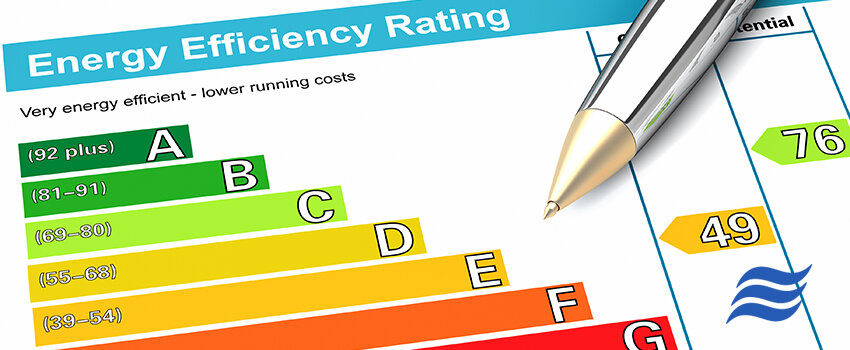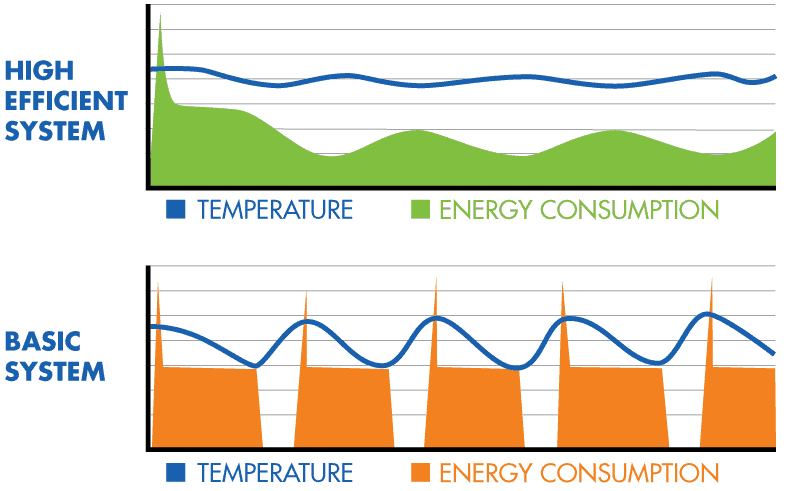
What makes an AC system high-efficiency?
When the summer heat rolls into town, you want the inside of your home to stay cool and comfortable. If you're researching the best high efficiency AC systems, there are more options available than ever before – which makes finding the best choice for your home more difficult.
With people becoming more aware of the need for eco-friendly HVAC systems and the importance of energy conservation, the Department of Energy is urging US homeowners to install the most efficient air conditioning system they can afford.
But in terms of comfort (and affordability), are these energy-efficient units the best choice? What makes them high efficiency in the first place? Here's our rundown of what makes an HVAC high efficiency and if they're worth the investment.
How is AC efficiency measured?
AC cooling efficiency is measured and indicated by a SEER rating (Seasonal Energy Efficiency Ratio). The higher the SEER rating, the more efficient the system is.
All new ACs are required by the Environmental Protection Agency to have a minimum SEER rating of 14. Modern cooling systems can have SEER ratings as high as 26, and some specialty systems have even higher ratings.
How efficient are older AC models?
Generally speaking, older air conditioning systems are less efficient. Not only has technology advanced a lot in the last 10-15 years, but over that time, with regular wear and tear, dirt and debris, your system's components start to wear out and run less efficiently.
Just like with your car, your body or your home, your HVAC system will fail faster if you ignore it. Servicing your system is vital.
It's more expensive to run a low-efficiency system on a day-to-day basis, and all central systems should be maintained and inspected regularly to keep them in peak operating condition.
Think of AC efficiency like this:
How efficient is your air conditioner at turning your hard-earned cash into cold air? The more efficient, the better! Just about any system will deliver cold air, but at what cost?
How can I make my current AC more efficient?
Your AC unit will work most efficiently when it's maintained regularly. I know we say this a lot and probably sound like a broken record, but seriously maintenance is key to a long-lasting system? A few tips to keep in mind are:
- Preventative maintenance: Have your AC system serviced regularly, at least once a year before the summer heat hits Northern Virginia. AC systems get dirty when they're not maintained properly – REALLY dirty! Especially if you have pets. Your AC system can even become a place where bacteria and mold can grow. This directly impacts the air you breathe every day. Keeping your system clean, and getting it checked and maintained properly each spring goes a long way to help your A/C system work efficiently, last longer, and (most importantly!) cool down your home better.
- Change your filter regularly: It's impossible to overstate this. You NEED to change your air filter regularly*. When the AC filter isn't changed regularly, the AC has to work harder to breathe, airflow is needed to produce the temperature you want. This adds stress to the system, which can cause expensive problems – and a much less efficient system. Imagine running up a hill with your hand over your mouth… that is what you are doing to your system when you ignore dirty filters.
*Regularly – the frequency depends on the kind of filters you have, do you have pets and a lot of occupants in your home. Read our post on filters to learn more about the importance of changing them regularly. - Ensure a good airflow. Anything that blocks your AC from getting air puts a lot of stress on the motor and stops air from traveling across the evaporator coil. This part is so important because it's the cold part! Your AC system will work more efficiently and perform better with good airflow. Ignore this and say hello to a frozen system or components dying before their time.
- Airflow and your outdoor unit: Your AC unit needs somewhere to push all that hot air, so keep your outdoor units clear of weeds, leaves, and plants. If the system is crowded with debris and the flow of air is blocked, the unit will be more costly to run, and it won't work as well. AND that will make the system work harder, which means components heat up and that is what makes them fail.
- Find freon leaks and fix them early: Freon is not a consumable, it should never need to be “topped off”. If your freon is low… you have a leak. Freon (also known as R-22) use was heavily restricted in 2010 by the EPA and is banned entirely in new AC systems. This has caused the cost of it to skyrocket – the current price of Freon is more than twelve times what it was in 2004. So, if your system is leaking, it can be a really expensive problem to fix.
- Repair leaky ducts: Leaking ducts can lose as much as 30% of that nice, cold air you just paid for before it even gets to you! Leaky air ducts = serious efficiency issue.
- Change failing components: When capacitors or other components start to fail, or not work properly, get a professional to replace them as soon as possible. One part not functioning at 100% means that other (more costly) parts have to work harder. This means they'll break sooner than expected, and they'll be more costly to repair. If your service technician advises replacing capacitors, do it as soon as possible. Remember Murphy's Law – a system failure can and will happen on the hottest day of the year, probably when you have friends or family over!
Sometimes you can tell when your system is struggling, it takes a bit longer to cool or it never really gets as cool as it once did. This is an obvious time to call a professional, but many issues go without showing obvious symptoms to the homeowner. The only way to catch these issues early is to have a maintenance agreement with a reputable AC company. They come out twice a year, once before heating season and once before cooling season, to check out the whole system. They will test capacitors, check for leaks and clean the parts that need regular cleaning. Preventative maintenance is one of the best investments a homeowner can make to keep their whole AC system running longer and at peak performance.
How are high efficiency AC systems better?
Higher efficiency systems use the latest technology to perform better than their predecessors. The best of them have exceptional variable compressors, that work to keep the best comfort level, by turning on and off as little as possible. Turning on and off doesn't only put your system through wear and tear, it takes big bursts of expensive energy and doesn't even keep your home consistently cool!
Your home comfort lies with the indoor variable-speed blower, the intelligence of the thermostat and the outdoor condensing unit. Today's high efficiency AC systems have compressors that can manage the flow of refrigerant and airflow through your systems. This means you'll get capacity as you want it when you need it.
Newer AC systems are cheaper to run because they're better at turning hot air into cool air. Thanks to advances in technology and design, modern AC systems are more effective than ever. Cutting down on energy use also means they're more environmentally friendly.

A newer, more effective AC system is definitely worth thinking about for your home – after the initial investment cost, they can save you a lot of money on your energy bills in the long run.
What are the benefits of a new high efficiency AC system?
- A continuous blower system: A big plus of having a high-efficiency, variable capacity (multi-stage) AC is the constant nature of air circulation. Instead of the annoying on/off cycle of older, less effective single-stage systems, this method helps to reduce random bursts of cold air and regulates humidity.
- Variable speed adjusters: This gives the system more control over performance, occupant comfort and performance. Take the Carrier Infinity 20 – it has load matching performance with speed ranges between 40% and 100% capacity.
- They cost less to run: Better at making hot air cold = lower energy bills.
- Media filters for better filtration: High-efficiency media filters are very thick – usually 4 inches or more – and thanks to their accordion-style design, they have a larger surface area. So the air that circulates around your home is much cleaner, and less dirt gets into your AC system. [link to air filter blog post]
- Sound reduction: Thanks to compressor sound blankets and upgraded fan blades, the sound can be as low as 58 decibels.
Is it expensive to have a high efficiency AC system?
While they might cost more in the short term, in the long term high-efficiency ACs are a lot cheaper.
They use less electricity, they're cheaper to maintain, and they last longer. Of course, like buying anything new, you should consider the investment. How long will you stay in the home, and what savings will you see on your energy bill?
Having a high-quality AC system is a vital part of your home's upkeep, and making your home a comfortable space for your family.
Buying a better model may seem expensive now, but it will save you a lot of hard-earned money in the long term and keep your family more comfortable.
If the AC system you have is struggling to cool down your home, call Nichols and Phipps to come out and find out why your system is struggling.
